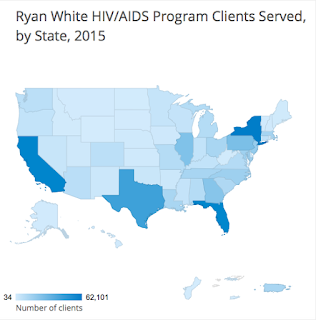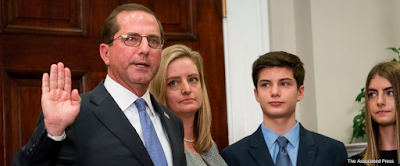The ADAP Advocacy Association earlier this week joined with the Community Access National Network (CANN) in issuing a strong rebuttal to the expected approval of new federal rules sanctioning discrimination by healthcare workers. The “Moral Exemptions & Accommodations for Coverage of Certain Preventive Services Under the Affordable Care Act” — which was initially published in the Federal Register on October 13, 2017, and subsequently on January 26, 2018 — harkens the United States back to the dark, early days of the AIDS epidemic. It is absolutely deplorable!
 |
| Photo Source: BSNtoMSN.org |
Clearly, most of the anti-gay and anti-AIDS posturing is coming from our esteemed Vice President (pun intended). The buck stops with the (crazy) man at the top, and he is who must be held accountable for sanctioning this discrimination.
In fairness, such laws are nothing new. So-called "Church Amendment" laws date back to the 1970s. Most recently it was the Affordable Care Act (Pub. L. No. 111-148 as amended by Pub. L. No. 111-152) itself that included such conscience protections regarding abortions and assisted suicides. The newly released proposed federal rules go further, though.[1]
The target of the so-called "Conscience Rule" are women seeking abortions, but also an entire group of people who identify as gay, lesbian, bisexual, or transgender (LGBT). Its potential reach has broader implications. And as such the reaction from the medical community, scientific organizations, patient advocacy groups, mainstream religious institutions, and so many others has been overwhelmingly negative.
It was summarized best by our board member and former Registered Nurse, Wanda Brendle-Moss:
"As a practicing nurse in Winston-Salem, North Carolina during the early 1980s, I witnessed firsthand the devastating impact of a new illness that was wreaking havoc on the gay men. What made the circumstances robbing so many lives even harsher was medical professionals refusing to treat these patients because they feared the illness. That illness would soon have a name, and it remains with us today: AIDS. Though we’ve made a lot of progress in fighting this deadly epidemic — which as taken nearly 40 million souls from us globally — that fear remains today. Unfortunately, new guidance issued by our government only makes matters worse."According to Brendle-Moss, trying to comprehend the long range impact of the changes is incomprehensible. In her estimation the "First, Do No Harm" oath taken by all medical students could now be replaced with the prejudicial refusal to provide care and treatment. As a woman living with HIV/AIDS, she fears for the future of her longtime profession if it is allowed to be held hostage to religious fanaticism. She rhetorically asks, "What will be the standard of care for persons diagnosed with AIDS, or women seeking family planning services?"
It isn't only the LGBT community that is concerned. Women are also rightfully worried, especially those who are battered women or rape victims. We've already seen how people living with HIV/AIDS were treated at the outset of the AIDS epidemic. All of these groups...and others...could be faced with legalized refusal to treat under these new federal regulations.
Read the Joint Statement on Discriminatory Proposed Healthcare "Conscience Rule".
__________
[1] Mohr, Aaron, and Allison Smith (2018, February 9); How HHS’s New Division in the Office for Civil Rights Will Enforce Rights of Conscience and Religious Freedom; JD SUPRA. Retrieved from https://www.jdsupra.com/legalnews/how-hhs-s-new-division-in-the-office-38382/.






